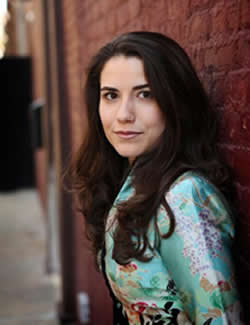This preview has been provided by the North Carolina Symphony.
On January 27, 1756, Wolfgang Amadeus Mozart, who would become one of the greatest musical geniuses of all time, was born in Salzburg, Austria. To the date, 261 years later, the North Carolina Symphony performs its Mozart’s Birthday concert, January 27 and 28 at Meymandi Concert Hall in Raleigh and January 29 at UNC-Chapel Hill’s Memorial Hall. The all-Mozart program includes vocal works, a rondo for piano, an operatic overture, and the Symphony No. 39, highlighting Mozart’s exceptional skill across multiple musical forms.
The award-winning soprano Joélle Harvey will be soloist in the vocal works, including Exsultate, jubilate, one of Mozart’s most popular compositions. With its three-movement structure and interplay between the orchestra and soloist, Exultate, jubilate is often thought of as a vocal concerto. (Interestingly, the work was not originally written for soprano, but rather a “castrato” – a male singer who had been emasculated as a child so that his voice would not change.) Harvey will also sing dramatic recitatives and arias. “Basta, vincesti – Ah, non lasciarmi” is set to words by Pietro Metastasio, based on the scene from Dido and Aeneas in which Queen Dido kills herself after being abandoned by her lover. “Ch’io mi scordi di te – Non temer, amato bene” was composed for the soprano Anna Selina Storace, who played Susanna in the first production of Mozart’s The Marriage of Figaro, and deals with the themes impossible love, suicidal ideation, and railing against fate. “Un moto di gioia” was tailor-made for Adriana Ferrarese del Bene – the subsequent “Susanna” – to sing in a revival of The Marriage of Figaro.
Pianist Clara Yang, who is Assistant Professor of Music at UNC-Chapel Hill, will join the Symphony to perform Mozart’s Rondo in A Major. It is fortunate that this work exists for performance: In the 1840s, it was sold at auction, page by page. Over time, pages were re-discovered and pieced back together, and the brilliant rondo was finally fully reconstructed 150 years later.
The program will be bookended by the Overture to Abduction from the Seraglio and the Symphony No. 39. “Turkish-style” music, with heavy use of percussion, which was in fashion at the time that Mozart wrote the opera Abduction from the Seraglio in 1782; the overture alternates this style with a more traditional Western European aesthetic. Mozart’s Symphony No. 39, one of his three final symphonies, is beloved for its sprightly first movement and affecting contrast of optimism and darkness in the second movement. In the finale, we find Mozart’s innovativeness, as he goes against the symphonic standards of the time in his approach to the movement’s main theme – making for the perfect conclusion to a concert dedicated to his musical mastery.
The North Carolina Symphony expresses its appreciation to Weekend Sponsor Duke Health and January 28 Concert Sponsor Galloway Ridge at Fearrington for their generous support.
North Carolina Symphony
Mozart’s Birthday
Friday & Saturday, January 27 & 28, 2017 at 8pm
Meymandi Concert Hall
Duke Energy Center for the Performing Arts
Sunday, January 29 at 7:30pm
Memorial Hall
UNC-Chapel Hill
PROGRAM
Mozart: Overture to The Abduction from the Seraglio
Mozart: “Basta, vincesti—Ah, non lasciarmi”
Mozart: Rondo in A Major for Piano and Orchestra
Mozart: “Ch’io mi scordi di te—Non temer, amato bene”
Mozart: Exsultate, jubilate
Mozart: “Un moto di gioia” from The Marriage of Figaro
Mozart: Symphony No. 39
PERFORMERS
North Carolina Symphony
Joélle Harvey, soprano
Clara Yang, piano
Grant Llewellyn, conductor
Tickets start at $18
Online: ncsymphony.org (TicketMaster fees apply)
By phone: 919.733.2750 ($8 processing fee applies)
In-person: NCS State Headquarters Offices (3700 Glenwood Ave., Suite 130, Raleigh)
About the North Carolina Symphony
Founded in 1932, the North Carolina Symphony (NCS) is a vital and honored component of North Carolina’s cultural life. Its 175 concerts and events annually are greeted with enthusiasm by adults and schoolchildren in more than 90 North Carolina counties – in communities large and small, and in concert halls, auditoriums, gymnasiums, restaurants, clubs, and outdoor settings. The Symphony’s 66 full-time musicians perform under the artistic leadership of Music Director Grant Llewellyn. David Glover is Associate Conductor.
NCS’s state headquarters venue is the spectacular Meymandi Concert Hall at the Duke Energy Center for the Performing Arts in downtown Raleigh. The Symphony’s service across the state includes series in Chapel Hill, Fayetteville, New Bern, Southern Pines, and Wilmington, as well as Summerfest concerts at the outdoor Koka Booth Amphitheatre in Cary. NCS brings some of the world’s greatest artists to North Carolina, including Lang Lang, Stephen Hough, and Augustin Hadelich in the 2016/17 season.
Committed to engaging students across North Carolina, NCS conducts the most extensive education program of any U.S. orchestra. In alignment with the music curriculum set by the North Carolina Department of Public Instruction, the Symphony provides training and resources for teachers, sends small ensembles into classrooms, and presents full-orchestra Education Concerts experienced by more than 52,000 4th and 5th graders each year. At the middle and high school levels, students have opportunities to work directly with NCS artists and perform for NCS audiences.
NCS is dedicated to giving voice to new art, introducing North Carolina audiences to 20 works by living composers – including two co-commissions – in the past year. In its 83-year history, the Symphony has given 47 U.S. or world premieres. NCS will appear at the John F. Kennedy Center for the Performing Arts in Washington, D.C. in spring 2017, as one of four orchestras chosen for the inaugural year of SHIFT: A Festival of American Orchestras – an honor that recognizes the Symphony’s innovative community partnerships and creative programming that inspires increased interest in new music. The Symphony will present works by composers with ties to North Carolina, including Sarah Kirkland Snider, Caroline Shaw, Mason Bates, and Robert Ward.
The first state-supported symphony in the country, NCS is an entity of the North Carolina Department of Natural and Cultural Resources.











